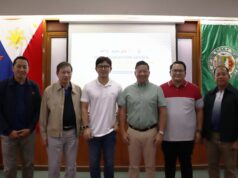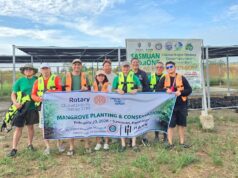ANGELES CITY – Citing a United Nations-backed report conducted by the International Displacement Moni-toring Centre of the Norwegian Refugee Council, a high ranking official of the Supreme Court (SC) revealed that “the biggest internal displacement of people for the year 2008 was here in the Philippines.”
In his speech, Deputy Court Administrator and SC Spokesperson Jose Midas P. Marquez said that the number of the newly displaced people in the Philippines in 2008 exceeded even that in Sudan, the country with the most number of displaced people resulting from the adversaries in the war-torn region of Dafur.
“An estimated 600,000 Filipinos fled fighting between the government and a breakaway faction of the Moro Islamic Liberation Front after the aborted signing of the Memorandum of Agreement on the Ancestral Domain that sought to create a Bangsa Moro homeland for the rebels,” the report said.
Marquez was one of the speakers of the photo exhibit and information caravan on International Humanitarian Law spearheaded by the Regional Trial Court (RTC) here and the city government. The event was held Friday at the City Hall.
“We are gathered in a collective effort to give substance to a principle: respect for International Humanitarian Law and protection of lives and dignity of those who are not or no longer involved in an armed conflict,” said Marquez.
The principle, he said, is espoused jointly by the Philippine Judiciary, the ICRC [International Committee of the Red Cross], and the PNRC [Philippine National Red Cross].
Marquez also said that there is an immediate need to take initiatives to promote the principles of International Humanitarian Law (IHL) in the Philippines.
Marquez said the message behind the report is clear: “there is no need to look beyond our territorial boundaries so as to grasp the significance of IHL and bring its concept into greater consciousness of the public.”
“Our launch today is but a small austere step in the big struggle to uphold humanitarian law, a kind of struggle that tries and tests the spirits of men. It cannot be won overnight. But for as long as we do not lose sight of our purpose, the only way we can fail in this task is for us to surrender to drudgery and cynicism,” he said.
ICRC Manila Communication Delegate Anastasia Isyuk also disclosed that more people continue to suffer due to lack of food, shelter, clothing and medicines due to various conflicts especially in Mindanao.
However, she said the ICRC and the PNRC will also continue to work and assist victims of wars and internal violence.
For his part, Supreme Court Administrator Jose P. Perez said that the IHL information and awareness campaign is a continuing project of Supreme Court Chief Justice Reynato Puno. Some of his projects include the creation of the mediation centers and the “Justice on Wheels” that aims to make justice accessible to the disadvantaged sector of the society.
In his speech, Deputy Court Administrator and SC Spokesperson Jose Midas P. Marquez said that the number of the newly displaced people in the Philippines in 2008 exceeded even that in Sudan, the country with the most number of displaced people resulting from the adversaries in the war-torn region of Dafur.
“An estimated 600,000 Filipinos fled fighting between the government and a breakaway faction of the Moro Islamic Liberation Front after the aborted signing of the Memorandum of Agreement on the Ancestral Domain that sought to create a Bangsa Moro homeland for the rebels,” the report said.
Marquez was one of the speakers of the photo exhibit and information caravan on International Humanitarian Law spearheaded by the Regional Trial Court (RTC) here and the city government. The event was held Friday at the City Hall.
“We are gathered in a collective effort to give substance to a principle: respect for International Humanitarian Law and protection of lives and dignity of those who are not or no longer involved in an armed conflict,” said Marquez.
The principle, he said, is espoused jointly by the Philippine Judiciary, the ICRC [International Committee of the Red Cross], and the PNRC [Philippine National Red Cross].
Marquez also said that there is an immediate need to take initiatives to promote the principles of International Humanitarian Law (IHL) in the Philippines.
Marquez said the message behind the report is clear: “there is no need to look beyond our territorial boundaries so as to grasp the significance of IHL and bring its concept into greater consciousness of the public.”
“Our launch today is but a small austere step in the big struggle to uphold humanitarian law, a kind of struggle that tries and tests the spirits of men. It cannot be won overnight. But for as long as we do not lose sight of our purpose, the only way we can fail in this task is for us to surrender to drudgery and cynicism,” he said.
ICRC Manila Communication Delegate Anastasia Isyuk also disclosed that more people continue to suffer due to lack of food, shelter, clothing and medicines due to various conflicts especially in Mindanao.
However, she said the ICRC and the PNRC will also continue to work and assist victims of wars and internal violence.
For his part, Supreme Court Administrator Jose P. Perez said that the IHL information and awareness campaign is a continuing project of Supreme Court Chief Justice Reynato Puno. Some of his projects include the creation of the mediation centers and the “Justice on Wheels” that aims to make justice accessible to the disadvantaged sector of the society.




